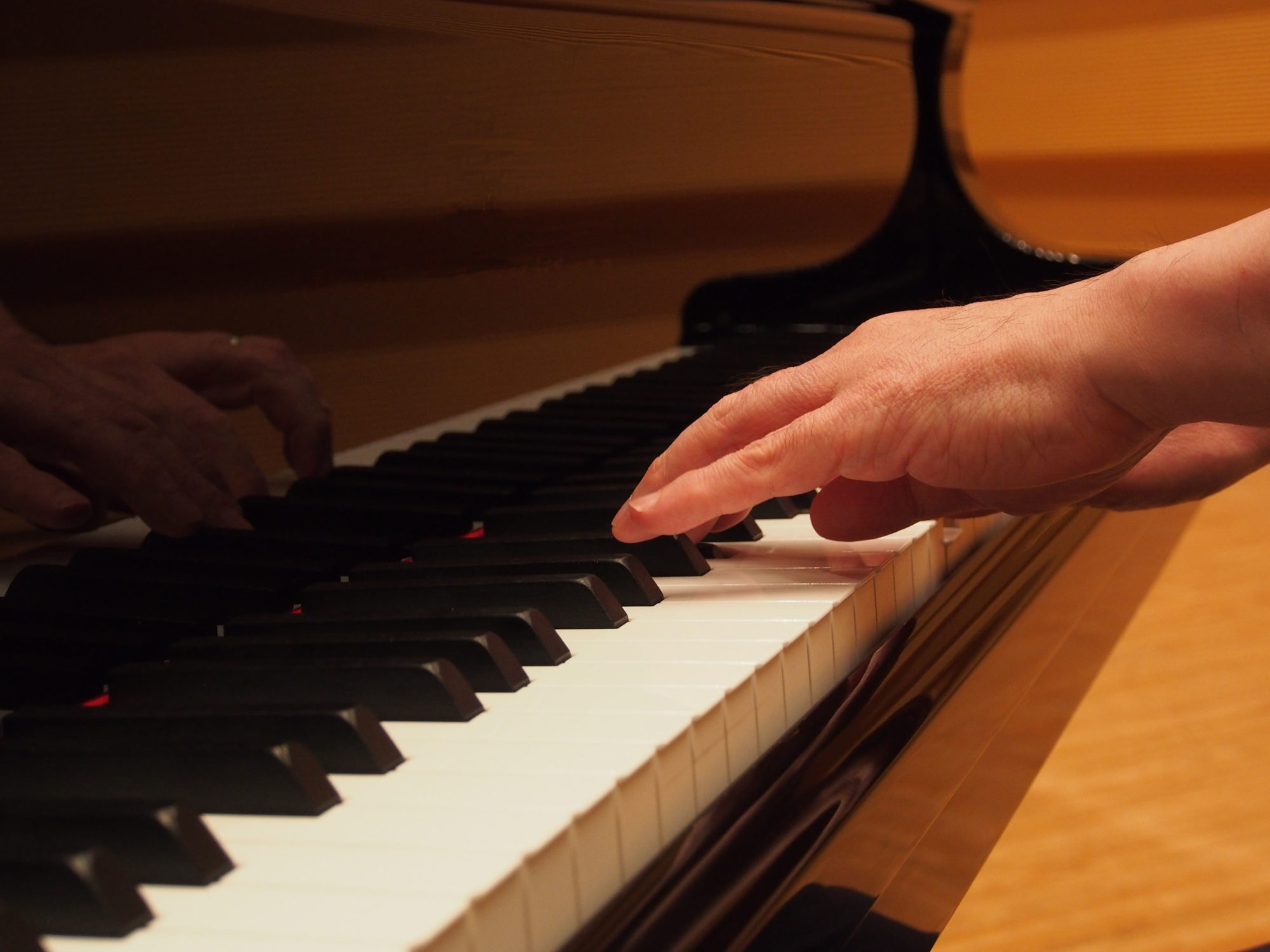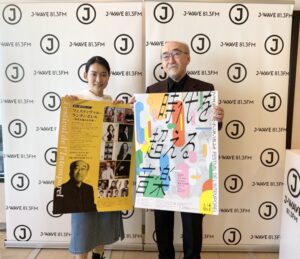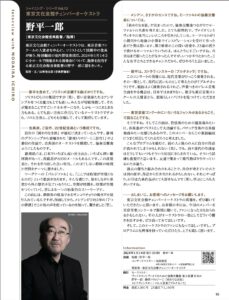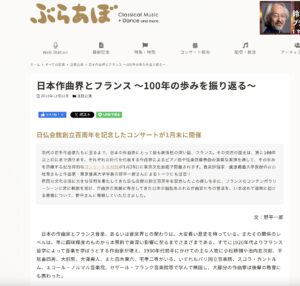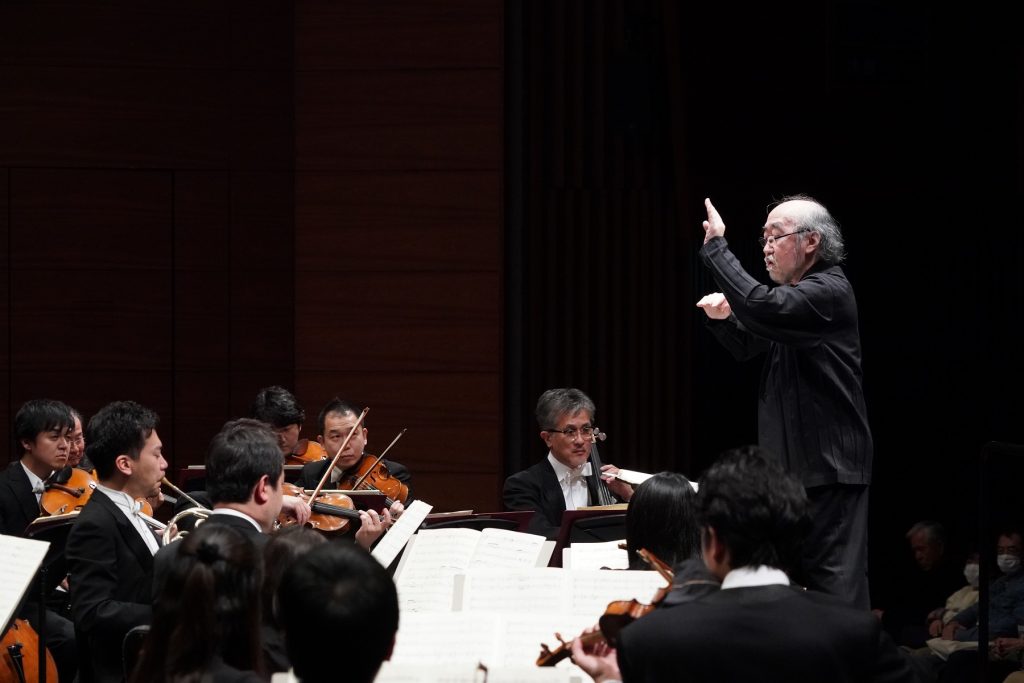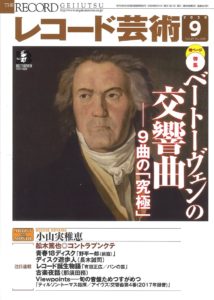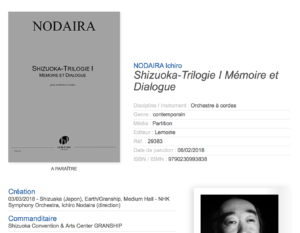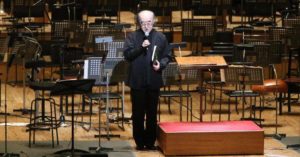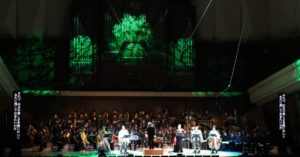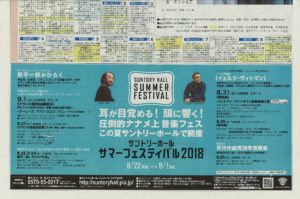テレビ東京『東京交差点 ONE MOMENT』楽譜だけでは伝わらない音楽の真実
録画はこちらから↓

~楽譜だけでは伝わらない 音楽の真実とは?~ベートーヴェンやドビュッシーの研究家で、東京文化会館の音楽監督、東京音楽大学の学長など多方面で活躍している。昔も今も、心安らぐ場所は上野の街。11月には、上野の東京文化会館で「フェスティヴァル・ランタンポレル」が開催される。イベントを通じて、観客に伝えたい事とは? ナレーター:増田俊樹(ますだ としき)
J-WAVE ARTS COUNCIL TOKYO CULTURE COLLAGE (10:40-10:50)東京に集うカルチャーをコラージュしていく10分間! 小川沙良さんの番組に出演しました。11月13日収録。放送の内容はpodcastで配信中。https://j-wave.podcast.sonicbowl.cloud/podcast/7ff80607-9cf8-4788-ba8a-2c4f5aa176f8/
11月17日の放送では、11月27日から東京文化会館で開催される
野平さんがプロデュースを務める「フェスティヴァル・ランタンポレル」について、今年は、ベートーヴェン&フィリップ・マヌリ、シューベルト&ヘルムート・ラッヘンマンという組み合わせで、現代と古典の4名の作曲家にフォーカス。
「フェスティヴァル・ランタンポレル Festival de l’Intemporel〜時代を超える音楽〜」は
NewsweekのWorldfolioにインタビューが掲載されました
Tokyo College of Music: Here to Make Music and Traditions
Interview – August 12, 2024
For over 115 years the Tokyo College of Music has been contributing significantly to the development of Western classical music in Japan. ICHIRO NODAIRA | PRESIDENT AND REPRESENTATIVE DIRECTOR OF TOKYO COLLEGE OF MUSIC
Can you talk a bit about internationalization in terms of your college studies and music studies in Japan?
The college was founded 117 years ago, and since then, the spirit of internationalization has been a fundamental feature or keyword of our mission. Still, I think before we talk about the university, we need to talk about the market, which must become more accessible. It has to be opened, and the atmosphere needs to be nurtured. That’s very important.
For example, if we think about orchestras, compared to twenty years ago, the number of non-Japanese musicians who perform regularly in orchestras has increased. Still, compared to Europe and North America, the number of non-Japanese performers is about half their level. Japanese society hasn’t reached that point, but we have the possibility of getting there in the future. It is increasing gradually, and speaking of this college, the number of non-Japanese professors is increasing, so I think we will eventually get to that state.
When we think about internationalization at the university, we need to think of Western music in Japan in a context unique to Japan because we only have a short history of Western music here; it’s only a bit over 150 years. Because of that, I want to encourage our Japanese students to study abroad. I really want them to experience Europe firsthand because it is where Western music was born. We want students to experience life there and understand the environment where music was born. We also want Japanese students to see their own country from a different perspective as a result of that overseas experience. By going abroad, Japanese students will learn who we are, what kind of mindset and thoughts we have, and what kind of music we create. By going overseas, we can learn those things so well.
On that topic, ten years ago, it was a one-sided situation whereby Japanese students went overseas, but as a university, we hope that direction becomes two-way. At Tokyo College of Music (TCM), the Music Liberal-Arts major now has a semester system, with new students joining in September. This semester system will make it easier to accept non-Japanese students and to send Japanese students overseas.
We have significantly increased the number of non-Japanese students, and we are committed to making the flow of students go both ways. In fact, I can’t say the number of foreign students is large, but it is on the rise, so we are also getting students from Europe who want to study here. For example, tomorrow, I’m going to give a lesson to a student from Hungary. This person is studying composition at the Liszt Ferenc Academy of Music. Still, this person has also studied in Istanbul and Estonia and then came to Japan, so he has this desire to learn and experience various cultures. It makes me realize that especially students who come to Japan from Western countries look for something more than just Western music taught in Japan. What they expect from Japan is something that cannot be experienced in other regions as well as our unique culture, so experiencing Western music within the bounds of the Japanese context is insufficient.
For another example, last year, I looked after a student from Birmingham, England, who was studying contemporary music, but she was also interested in jazz, pop, synthesizers, and many other areas. This really made me consider what the needs of non-Japanese students and what they expect from us will be in the future. It’s not just Western music we need to think about. As a university, we must be prepared or have the attitude to provide exposure to the various cultural aspects of Japan. I think that attitude is going to be important.
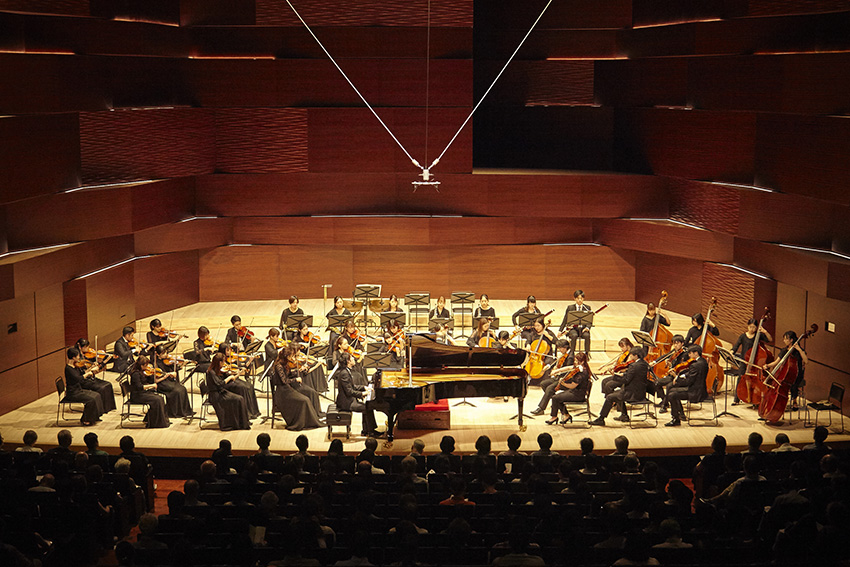
Japan should be a very attractive place for students to come study. The universities have excellent facilities. There’s an increasing ability for students to learn through English, and the weak yen makes it cost-effective for students to come here. But when you look at the ratio of international students in Japan, it’s just 5%. In the UK, Australia, and Europe, that number is about 20% to 30%. What sort of changes do you think Japanese universities need to make in order to attract more foreign students to come here and study in Japan?
First, we must provide a quality education that is considered to be worth the investment. Second, more promotion is necessary because the international marketing capabilities of Japanese universities are still under development and are not strong enough yet. Third, we must provide a diverse program. At TCM, we have a program for ethnic music, where students can learn Asian instruments. For example, we have a class for traditional Indonesian music gamelan. That’s going to be one of the important parts of the future of our university because we must provide a diverse, high-quality program; otherwise, those who are interested in learning will not find it interesting.
We must increase the number of students from Asia as well. Asian students are looking to us to learn Western music here, just like Japanese students wanted to go to Europe to study Western music twenty years ago, so we must develop ourselves in this area as well. To give you an example, we just had an information session on Zoom with Indonesian student candidates, and then we had a master class. A number of Indonesian students showed strong interest. In general, we need to strengthen the relationship between Southeast Asia and Japan.
As for the internationalization of our university, we have collaborations with multiple music universities, and we update the conditions and nature of these relationships regularly. These collaborations with non-Japanese universities include exchange programs, and we are currently sending students overseas to Europe. When we do that, we hire an English tutor for our students going overseas, and we also hire a Japanese tutor at TCM to support foreign students’ learning here.
The exchange program is not limited to students but also includes faculty. We invite a number of professors from overseas to teach master classes for both long and short programs, and we are getting a lot of support for this from various collaborating musical institutions. In fact, I just came back from France two days ago. I was there to talk with the École Normale de Musique de Paris and promote a collaboration agreement.
For students who want to study abroad, having choices of destination is very important, so we are going to enhance the number of choices. In music study, particularly, specific universities are often well known for specific instruments or professors, so having partnerships with more of these institutions is very important, and we’re focusing on that.
Can you talk a bit about the employment opportunities for graduates, including these international students?
At TCM, we provide very thorough career support. We have a career support center where the staff and counselors meet with students and help them find employment. We also provide that support for non-Japanese students, and we have many cases where they were successful in finding jobs. For example, graduates have found jobs at a gaming company, teaching music, or even selling musical instruments.
Japanese business practices, especially those involving hiring, are very different from other countries. Sometimes our career counselors mention that the non-Japanese students’ mindset doesn’t really match the Japanese business or hiring practices. For example, one of our students had an interview with an entertainment company and was asked where they saw themselves in the future: in one year, in five years, or in ten years. For non-Japanese students, this can seem like a silly question as the future is unknown, and they may wish to change jobs, but Japanese companies are looking for someone who can work for their company for a long time, so this is a bit of a mindset mismatch.
What we do at TCM to help non-Japanese students looking for a job is to have meetings with them at the career support center where counselors can offer guidance for interviewing and conduct practice interview sessions as well so that the students can learn about how to navigate the job search process in Japan. Some students may need to stay after graduation to continue searching for a job and to do that, the type of visa needs to be changed, and we can help with that. We also help students get letters of recommendation and provide support for improving their Japanese language skills.
You recently launched a Music Business and Technology (MBT) major, which was featured in April in The Nikkei. I find this course interesting because it teaches students not only about new technology but also how to use technology in business. Of course, we’re seeing an increasing use of technology and AI in music, be it digital mastering, sound design, etc. The challenge for a course like this is that the technology changes so quickly. How do you ensure that the curriculum and the faculty stay up to date with new developments?
Making progress by introducing new developments is very important for this Music Business and Technology major. Mr. Arima, an associate professor of MBT, is one of the experts in the evolution of technology and art over the past twenty years. He has been deeply engaged in most performances of Japanese and non-Japanese works using electronics in festivals and concerts in Japan. We managed to get him to teach his vast knowledge and experience at our college. Mr. Arima probably knows the whole history of the evolution of music and technology, both hardware and software and that such knowledge is very important to solve the issue of archiving. How to exactly reproduce music that used the technology of ten years ago is a challenge because when the software and hardware change, reproduction is not the same. If it is a violin piece from years ago, we can reproduce it today with another violin, but a piece of music using electronics is a different story.
There are two other key people in that program: Dr. Shibayama and Dr. Haneishi. They teach about computers from top to bottom, namely from visible parts to hidden aspects. What I mean by the top is man-machine interfaces, that is to say how humans operate a computer and obtain information from it. The bottom is about programming and how the computer works, so this course even teaches mathematics. We start with mathematics, which goes hand-in-hand with teaching everything about computers.
We only started this program this year, but 40 or 50 students have already shown interest and are enrolled, which makes me think that this was the kind of course students were looking for. Now, we need to provide support so that the students don’t feel like they are falling behind, which is a real possibility.
Of course, these students are interested in music and information and communication technology (ICT), but learning about music and technology alone is not enough. They need to learn about art, architecture, movies, and design, so collaboration in this field is going to be important. We are speeding up our efforts in this area. For example, we recently started a collaboration with Tama Art University.
As a music college, finding a good balance is very important because we have students who are learning acoustic instruments, so what I mean by balance is considering both acoustic and computer music. What’s important in music is developing the ear and nurturing the senses. If you ask about how to study music, the only answer is to listen to good music by good performers. There’s no other way. Think of an art appraiser trying to distinguish between authentic and forged art. There are no criteria or standards to teach this skill. The only thing you can count on is the eyes of the appraiser and how much authentic work this person has been exposed to, and music is just like that. In music, the ear is very important, and the only thing to distinguish the quality is the capability of making a judgment by listening.
Considering artificial sounds, one of the two aspects of balance, it has started only in the mid-twentieth century. It has evolved from electronic music, musique concrete, live electronics, and then into synthesizers, and the computer just incorporated all of them and even became a way to listen to traditional music now. It’s a convenient tool, but in terms of quality, it’s not the best. For musicians, the ear or hearing capability and natural acoustics are very important, so even though we teach about computers, we want the students to have this acoustic study experience.
Of course, those who study acoustic music need to learn how to record music using a microphone, and those who study computers need to know the true or live music, so that’s what I mean by having a balance between acoustic and computer music because each influences the other.
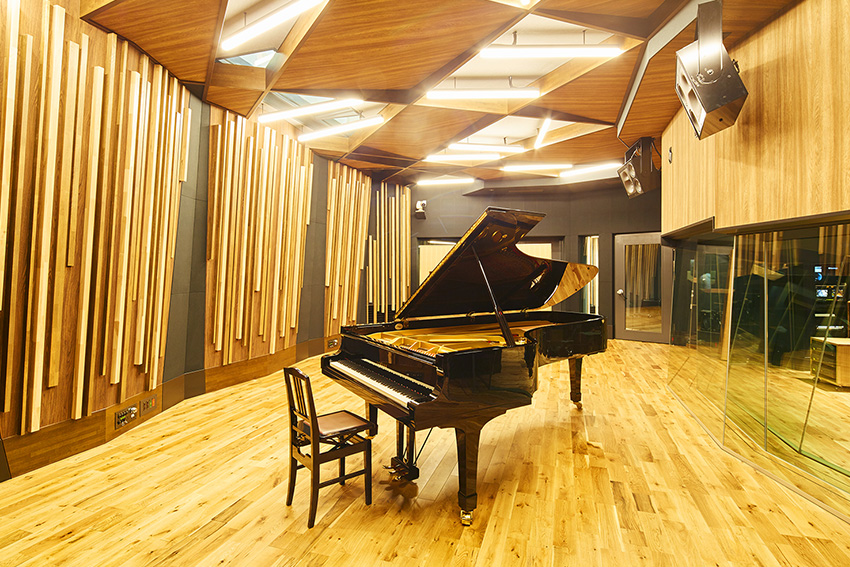
At our Naka-meguro・Daikan-yama campus, we have a studio with high-specification equipment available. We hope that using that facility will help to maintain that good balance.
When it comes to change at the university, we first talked about internationalization and then technological promotion and advancement. To me, those things go hand-in-hand, and both lead to the third key, which is diversification. When I first encountered a computer and the Internet, it was the 1980s when I was receiving training in computers in France at the Institut de Recherche et Coordination Acoustique/Musique (IRCAM). At that time, many critics were saying that if technology continued to develop, English was going to be the hegemonic language and that it would just incorporate all the cultures in the future. I had that concern as many others did, but now, 40 years later, it didn’t develop that way. On the contrary, computers have developed in such a way that we can use the languages of any ethnic minority more easily and make the most of them. For example, if I want to talk to a composer from Estonia about his or her music, I can do that using a computer and the Internet, and I can even understand an explanation of his or her work in the Estonian language thanks to translation software that is readily available. In that sense, the computer is opening up the world in terms of language and that is very important for art.
I say that because there has been a trend that younger people gradually become alike in their hobbies, tastes, and performance styles in terms of their performance and composition regardless of country. What makes each performance and composition different in such circumstances is how and what they think in the languages they use. For example, when I was a judge in the composition category of a music competition in Geneva in 2017, I looked at over 60 scores, and by just looking at the scores, you can’t tell which country the score is from. Out of those 60, 30 of them used similar figures developed in similar ways. Of course, they are not exactly the same, but what makes the difference is the language they use in thinking and its thought form. Hence, as more and more young people have the same hobbies and similar tastes, I think language enriches the world of art; it helps us transcend a superficial resemblance and makes a difference.
This all leads to the point I made about diversity, and regarding that, we are currently at the stage of transformation. This also goes back to your first question about what we need to do, which is to address diversification. Unless we address this matter, we won’t be able to solve the issues of internationalization.
Thank you very much for your insights, especially regarding internationalization. To wrap up, I would like to ask more of a personal question. As the President of TCM and also an active composer and concert pianist, if we were to come back to interview you a second time on the last day of your presidency, whatever that may be, what goals or ambitions would you like to have achieved?
So many things can happen at the university, and we have more issues besides internationalization or digitalization. My tenure as president is four years, and I am in my second year. How much I can achieve or what I can achieve before the end of my tenure is one way to look at it, but I truly believe that passion is what moves things forward and makes a difference from the past, so I would like to take on all the challenges with passion. To do so, using my previous experience as a musician might not suffice. Still, one important thing I want to do is to pave the way for the future. Unless we internationalize, there’s no future for Japanese educational institutions, so that is the most urgent and important task.
For more information, visit their website at: https://www.tokyo-ondai.ac.jp/en
日本芸術院会員に選出されました。 朝日新聞
音脈Vol.93に、2024年1月14日の東京文化会館チェンバーオーケストラについて、山崎浩太郎さんにインタビューされました。
2023年12月22日
第6回ジャック・ランスロ国際クラリネットコンクールファイナル曲委嘱
2023年8-9月
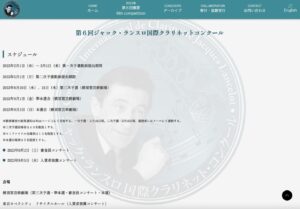
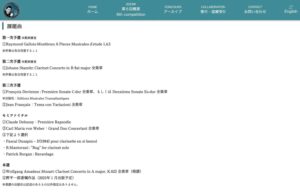
第52回ENEOS音楽賞を受賞により、新聞紙、音楽誌 各社よりインタビューを受けました。
音楽現代
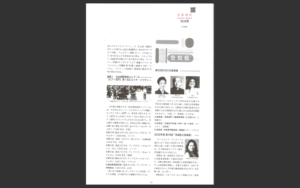
共同通信
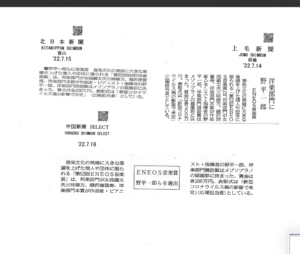
北海道新聞
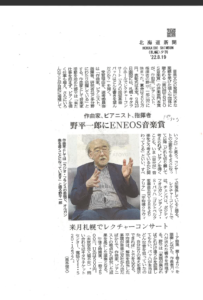
読売新聞
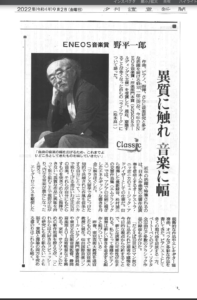
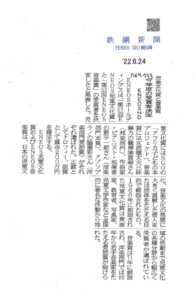
野平一郎さん・脇園彩さん『音楽の友8月号』 野平一郎さん・脇園彩さん『音楽の友8月号』

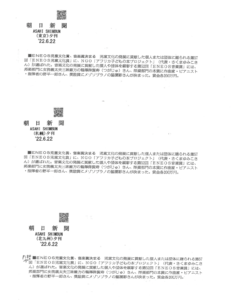
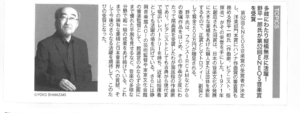
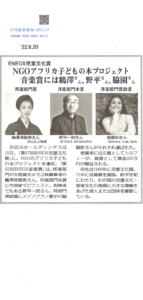
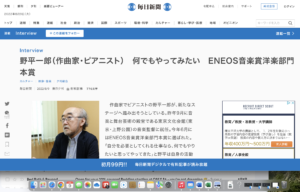
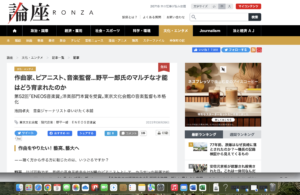
野平多美訳、野平一郎日本語版監修の書籍発売
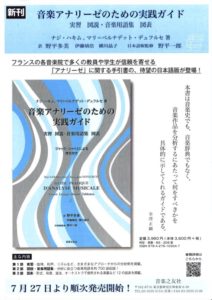
第52回ENEOS音楽賞 洋楽部門本賞 野平一郎

贈賞理由
現代は、ルネサンス時代のように多分野にわたって人並み外れた能力を発揮する万能の天才の出現は難しいといわれる。領域の分化や専門化がより先鋭化し、どれ一つをとっても充実した成果を収めることが容易ではなくなったからである。しかし音楽の多様な分野で超一級の成果を上げ続ける人がわが国にもいる。野平一郎氏は、フランスIRCAMなどからの委嘱作品を始め、その作品が2度にわたって尾高賞を受賞したわが国屈指の作曲家であり、ピアニストとしては、古典から現代までの幅広いレパートリーで、室内楽奏者やソリストとして力量を発揮、近年は指揮者としても活躍の場を広げている。しかもベートーヴェンのピアノ・ソナタ全曲の詳細な研究書を上梓する音楽研究者でもあり、さらには静岡音楽館AOIの芸術監督や東京文化会館の音楽監督として、館運営のみならず企画にまで優れた手腕を見せるなど、まさに多くの分野にわたって、縦横無尽の活躍を展開している。これまで重ねられてきた稀有の業績とわが国音楽界への貢献を顕彰するとともに、今後のさらなる活躍を期待して、ENEOS音楽賞本賞を贈賞する。
(音楽賞洋楽部門 選考委員会)
店頭に並ぶのは1/18(火)
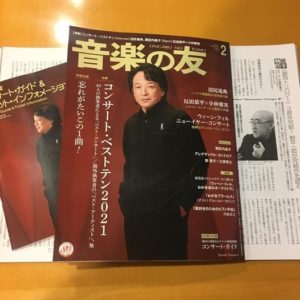
2021年5月のレコード芸術で、沼野雄司さんが、2003年の作品「ベートーヴェンの記憶」に触れてくださっている。
Il Nuovo e l’Antico. Quattro viole in concerto
2021年5月1日(土)午後5時
2020/21シーズン第13回カンテッリのコンサート
フラテッリ・オリビエリ講堂からのストリーミング
Forever Viola Quartet
Maria Ronchini prima viola
Silvia Rossi seconda viola
Martina Raschetti terza viola
Alessio Lisato quarta viola
progetto a cura di Maria Ronchini
Garth Knox (1956)
Marin Marais Variationen (2007)
Elaborazione su Folies d’Espagne
Yoichi Sugiyama (1969)
Kinderszenen (2017, da Robert Schumann)
opera commissionata dal Museo delle arti di Ohara
prima esecuzione italiana
Ichiro Nodaira (1953)
Ciaccona (2000, trascrizione dalla Partita n. 2 per violino solo di J. S. Bach)
presentazione di Maria Ronchini
東京藝術大学
第三十九回野平一郎「コロナ禍の中での退任の想い」
藝大を退任する大切な1年と思っていたら、新型コロナ・ウィルス感染拡大で、とんでもない年になってしまった。今年考えたことや体験したことは、恐らく一生記憶に埋もれることはあるまい。
さて、御多分に洩れず、今年、特に上半期は多くのコンサートが中止となり、私にとっても夏に予定されていた2つの大きな作品の初演が飛んでしまった。1つは東京オリンピック関係で、和太鼓のアンサンブルとアマチュアの大オーケストラの作品だった。五輪なので、和太鼓とオケで世界の五大陸の音楽を順次演奏していくというとてつもなく困難な注文(!!)だったが、アフリカやオセアニアなど、和太鼓でも演奏できる素材を見つけてはなんとか切り抜けて行った。1-2月にはコロナのニュースを横目で見ながら、まだなんとかモチベーションを保ちつつ作曲を続行していた。3月頭には感染を心配しつつも和太鼓を演奏してくださる林英哲さんの小田原の道場まで出かけ、無事リハーサルが始まり、よしっ、これからだと思った途端中止となった。もう1つは、ここのところ静岡で2年続いてきた委嘱作品の企画で、今年が3年目となる「静岡トリロジー」というオーケストラの3部作。NHK交響楽団が3回も続けて委嘱作品を演奏してくれるという、作曲家にとっては天から幸運が落ちてきたようなプロジェクトだったが、この3作目、最後の40分かかる作品は作曲中に中止が決まった。8月の初演予定だったから、少なくとも5月には写譜屋に渡さないとアウトだったが、再来年に延期が決まった途端、まったく筆が進まなくなった。作品は静岡出身の詩人、大岡信の詩の断片に基いたもので、割と抽象的な方向性、空間と時間を題材にしたもので、自分の今までの集大成を期すものだったが、締め切りをすぎて何ヶ月もかかって最後の二重線を引いた。楽譜が写譜屋に渡っても、果たしてこれで三部作がきちんと終わりまで書けたのかどうかの定かな判断もできないでいる。
このようにWithコロナの生活は、本当に緊張を強いるものだ。人と人とのコミュニケーションを分断してしまうだけなく、人の心理的な内面をも分解しかねない厄介なものである。今年は秋になってもレッスンやクラス授業等オンラインでの実施が主だった。作曲科の若い学生たちは、何とかオンラインについてきてくれて、せっせと作曲した譜面を送ってくれる。彼らとて、先生には打ち明けられない多くの悩みやストレスを抱えているのだろうに、頼もしかった。そんな苦闘は若さの持つエネルギーが吹っ飛ばしてくれる。そんな譜面であり、そんな作曲のアイディアである。彼らはきっとこのコロナが蔓延する新しい生活様式を新しい創造の形に変えていってくれるに違いない。そんな若い藝大生の活動をこの3月で見られなくなってしまうのは、寂しい限りだ。
レコード芸術誌9月号、ベートーヴェン特集ですが、私の青春18Disc前編です。小学校から芸高生あたりの年代によく聴いていたディスク
間宮芳生:エチュードⅣ、Ⅴ、Ⅵ_野平一郎(ピアノ)2005
野平一郎編曲/バッハ:ゴルトベルク変奏曲(セントラル愛知交響楽団)
N響メンバーによる古典派編+野平一郎 新作 静岡トリロジーⅡ「終わりなき旅」
2019年3月24日(日)
- N響精鋭メンバーが奏でるモーツァルト、そして野平一郎新作「静岡トリロジーII」(世界初演)
- NHK交響楽団が、世界的作曲家・ピアニストである野平一郎(静岡音楽館AOI芸術監督)の三部作「静岡トリロジー」を世界初演するシリーズ第2弾。今回はNHK交響楽団のメンバーが古典派を代表する作曲家・モーツァルトの名曲と共にお贈りします。
NHK交響楽団メンバー
野平一郎(自作のみ)
■曲目
W.A.モーツァルト:アダージョとフーガ ハ短調 K.546
野平一郎:静岡トリロジーⅡ 「終わりなき旅」(公益財団法人静岡県文化財団委嘱作品)
W.A.モーツァルト:交響曲第40番ト短調K.550
|
意気込みを語る野平一郎さん=都内で |
 |
国際的に活躍するピアニストで作曲家の野平(のだいら)一郎さん(65)が、静岡をテーマにした管弦楽「静岡トリロジー(三部作)」を制作している。昨春に一作目を発表、二作目「終わりなき旅」を三月二十四日、静岡市駿河区のグランシップでNHK交響楽団(N響)が演奏する。三部作が完結する来年は東京五輪・パラリンピックの年。JR静岡駅前の静岡音楽館AOIの芸術監督も務める野平さんは「五輪の文化プログラムとして静岡から世界に発信する音楽に」と意気込んでいる。
野平さんは東京都出身。東京芸大大学院作曲科を経てパリ国立高等音楽院に留学。ピアニストとして内外のオーケストラと共演しているほか、フランス文化省などからの委嘱作品など既に百曲以上を発表している。AOIの開館当初から企画委員としてかかわるなど静岡との縁は深く、今回のグランシップからの作曲委嘱を二つ返事で引き受けたという。
三部作はN響とのプロジェクトで、野平さんは「静岡の時間的、空間的壮大さを表現したい」と話す。「駿河湾の深い海から富士山へと押し上がる静岡という大空間、それを育んだとてつもない時間を三部作を通した道のりで表す」構想。「今の自分の作曲の集大成にしたい」と言う。
一作目は約十分の作品で「記憶との対話」と題して昨年三月三日に演奏。N響の弦楽器奏者十二人とチェンバロという小編成で、最後にバイオリンが静岡県の鳥サンコウチョウの鳴き声を奏でた。三部作にはクラシックの歴史も重ね合わせる考えで、一作目のコンサートではバロック編として別にバッハやビバルディも演奏した。
二作目の今回、野平さんは「自分の創作には完成ということがない」として「終わりなき旅」と題した。木管楽器が二人ずついる計約三十人の「二管編成」で、長い旅路でゆっくりと、あるいは素早く移り変わる情景を約二十分の作品で表現するという。静岡の四季をイメージした音色の多様さも聞きどころ。クラシックの歴史ではモーツァルトを取り上げ、交響曲第四十番ト短調などを演奏する。
来年の三作目の詳細は未定だが、編成はフルオーケストラで三十~四十分の作品になる見通し。三部を通しで演奏すると、一時間を超える大作となる。音楽の強弱記号で「だんだん強く」を表す「クレシェンド」のように、「フィナーレは華やかな作品にしたい」と話している。
三月二十四日は午後三時開演。S席五千百円、A席四千百円、就学児以上の子どもと二十八歳以下の学生は千円。未就学児は入場不可。問い合わせはグランシップチケットセンター=電054(289)9000=へ。
(五十住和樹)
間宮芳生オペラ「ニホンザル・スキトオリメ」
指揮者:野平一郎によるプレトーク 2019年1月27日
Orchestra Nipponica @ Sumida Triphony Hal
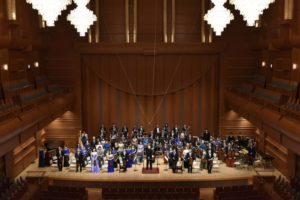
Orchestra Nipponica, which specializes in performing tunes composed by Japanese composers, will present two pieces composed by Michio Mamiya, a leading contemporary Japanese composer, on Jan. 27 to mark his becoming 90 years old, at Sumida Triphony Hall in Tokyo’s Kinshicho district.
The concert will feature a semi-stage version of Mamiyia’s 1965 opera “Nihonzaru Sukitoorime” (“Clairvoyant Monkey Painter”), which revolves around a monkey queen, who tries to make her beauty last for ever, and a monkey painter, who tries to express on canvas the reality of a ruler’s power and ordinary people’ life.
The opera, whose libretto was written by poet Hajime Kijima (1928-2004), will be presented for the first time in 53 years since its presentation requires the use of the pipe organ and Baroque and folk instruments like the lute, the recorder and the bagpipe. The libretto, originally a story for children, has been translated into English and Czech. The coming opera performance contains the prologue, the epilogue and eight scenes in one act.
Furthermore, “Interlude for the Queen of Monkey” — Mamiya’s latest piece composed in 2018 at the request of Orchestra Nipponica — will be performed as world premier.
Takashi Otsuki (tenor), Naomi Tasaki (soporano), Kei Harada (baritone), Koji Yamashita (bass-baritone), Tatsuhiko Kitagawa (also bass-baritone) and actor Yasuhiko Nemoto will sing or act on the opera stage. Vocal Consort of Tokyo and Chor June will sing as a chorus.
Ichiro Nodaira, also known as a pianist and composer, will conduct. Tetsu Taoshita will serve as stage director and Kazutoshi Shinomi as assistant conductor.
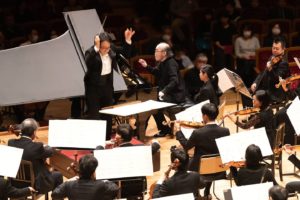
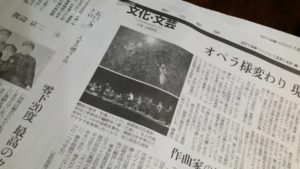
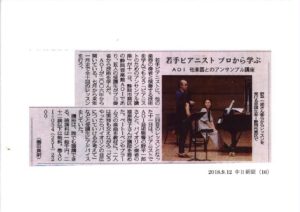
2018年レコード芸術10月号
「フランス音楽におけるドビュッシー」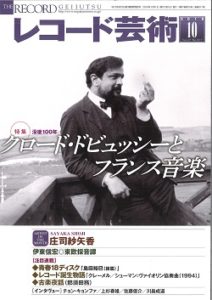
特集
フランス音楽におけるドビュッシー……野平一郎
フランス音楽を識るキーワード30……野平多美
管楽器大国フランスを彩る作曲家とその名曲……木幡一誠
古代・中世の芸術とフランス近代音楽……相場ひろ
【記】今井信子_20180813朝夕刊
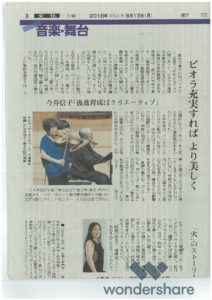
2018年6月9日収録・7月8日放送 室内オペラ「亡命」について
BACH CANTATAS WEBSITE
Ichiro Nodaira Profile 英語
NHK交響楽団とグランシッNHK交響楽団とグランシップのコラボ企画記事プのコラボ企画記事
NHK交響楽団x野平一郎プロジェクトシリーズ~バロック編
プリペアドピアノ
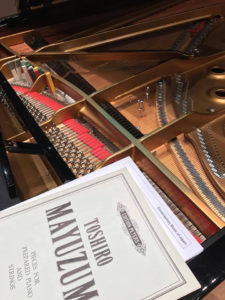

インタビュー記事 Interview
Heinz Holliger, composer / conductor / judge of Toru Takemitsu Composition Award 2017
野平一郎 ホリガーの《スカルダネッリ・ツィクルス》を語る

©Priska Ketterer
コンポージアム2017では、オーボエ奏者、指揮者、作曲家として活躍するハインツ・ホリガーを「武満徹作曲賞」の審査員に迎え、作曲家ホリガーの集大成といえる《スカルダネッリ・ツィクルス》(1975〜91)を日本初演します。 ホリガーに精通する作曲家・野平一郎氏に、作品の魅力、聴きどころをうかがいました。(2016年12月 東京オペラシティ文化財団)
東京オペラシティArts友の会会報誌「tree」Vol.121(2017年4月号)
野平一郎、ソロ・リサイタルは古典から現代音楽まで“小品の美”をたどるプログラム
エンタメ特化型情報メディアスパイス
インタビュー記事
2016.6.1
瞬間的な美を極める
クラシック音楽情報誌 ぶらあぼ
インタビュー記事
2016.5.18
ビデオ映像
スコアと演奏「野平一郎編《ゴルトベルク変奏曲》管弦楽版」解説 2/2
インタヴューならびに演奏映像は、2010年11月19日 三井住友海上しらかわホールでの世界初演時に収録したものです
エレクトリック・ギターと管弦楽のための協奏曲「炎の弦」
都響スペシャルと称して、Steve Vaiをエレキギター、佐渡 裕を指揮に迎えて都響によりプレイされた野平一郎作曲「エレクトリック・ギターと管弦楽のための協奏曲『炎の弦』」のニュース映像。演奏収録日は’02年7月25日ですが、実際には24~26日の3日間行われています。
レコード芸術誌9月号、ベートーヴェン特集ですが、私の青春18Disc前編です。小学校から芸高生あたりの年代によく聴いていたディスク
間宮芳生:エチュードⅣ、Ⅴ、Ⅵ_野平一郎(ピアノ)2005
野平一郎編曲/バッハ:ゴルトベルク変奏曲(セントラル愛知交響楽団)
N響メンバーによる古典派編+野平一郎 新作 静岡トリロジーⅡ「終わりなき旅」
2019年3月24日(日)
- N響精鋭メンバーが奏でるモーツァルト、そして野平一郎新作「静岡トリロジーII」(世界初演)
- NHK交響楽団が、世界的作曲家・ピアニストである野平一郎(静岡音楽館AOI芸術監督)の三部作「静岡トリロジー」を世界初演するシリーズ第2弾。今回はNHK交響楽団のメンバーが古典派を代表する作曲家・モーツァルトの名曲と共にお贈りします。
NHK交響楽団メンバー
野平一郎(自作のみ)
■曲目
W.A.モーツァルト:アダージョとフーガ ハ短調 K.546
野平一郎:静岡トリロジーⅡ 「終わりなき旅」(公益財団法人静岡県文化財団委嘱作品)
W.A.モーツァルト:交響曲第40番ト短調K.550
|
意気込みを語る野平一郎さん=都内で |
 |
国際的に活躍するピアニストで作曲家の野平(のだいら)一郎さん(65)が、静岡をテーマにした管弦楽「静岡トリロジー(三部作)」を制作している。昨春に一作目を発表、二作目「終わりなき旅」を三月二十四日、静岡市駿河区のグランシップでNHK交響楽団(N響)が演奏する。三部作が完結する来年は東京五輪・パラリンピックの年。JR静岡駅前の静岡音楽館AOIの芸術監督も務める野平さんは「五輪の文化プログラムとして静岡から世界に発信する音楽に」と意気込んでいる。
野平さんは東京都出身。東京芸大大学院作曲科を経てパリ国立高等音楽院に留学。ピアニストとして内外のオーケストラと共演しているほか、フランス文化省などからの委嘱作品など既に百曲以上を発表している。AOIの開館当初から企画委員としてかかわるなど静岡との縁は深く、今回のグランシップからの作曲委嘱を二つ返事で引き受けたという。
三部作はN響とのプロジェクトで、野平さんは「静岡の時間的、空間的壮大さを表現したい」と話す。「駿河湾の深い海から富士山へと押し上がる静岡という大空間、それを育んだとてつもない時間を三部作を通した道のりで表す」構想。「今の自分の作曲の集大成にしたい」と言う。
一作目は約十分の作品で「記憶との対話」と題して昨年三月三日に演奏。N響の弦楽器奏者十二人とチェンバロという小編成で、最後にバイオリンが静岡県の鳥サンコウチョウの鳴き声を奏でた。三部作にはクラシックの歴史も重ね合わせる考えで、一作目のコンサートではバロック編として別にバッハやビバルディも演奏した。
二作目の今回、野平さんは「自分の創作には完成ということがない」として「終わりなき旅」と題した。木管楽器が二人ずついる計約三十人の「二管編成」で、長い旅路でゆっくりと、あるいは素早く移り変わる情景を約二十分の作品で表現するという。静岡の四季をイメージした音色の多様さも聞きどころ。クラシックの歴史ではモーツァルトを取り上げ、交響曲第四十番ト短調などを演奏する。
来年の三作目の詳細は未定だが、編成はフルオーケストラで三十~四十分の作品になる見通し。三部を通しで演奏すると、一時間を超える大作となる。音楽の強弱記号で「だんだん強く」を表す「クレシェンド」のように、「フィナーレは華やかな作品にしたい」と話している。
三月二十四日は午後三時開演。S席五千百円、A席四千百円、就学児以上の子どもと二十八歳以下の学生は千円。未就学児は入場不可。問い合わせはグランシップチケットセンター=電054(289)9000=へ。
(五十住和樹)
間宮芳生オペラ「ニホンザル・スキトオリメ」
指揮者:野平一郎によるプレトーク 2019年1月27日
Orchestra Nipponica @ Sumida Triphony Hal

Orchestra Nipponica, which specializes in performing tunes composed by Japanese composers, will present two pieces composed by Michio Mamiya, a leading contemporary Japanese composer, on Jan. 27 to mark his becoming 90 years old, at Sumida Triphony Hall in Tokyo’s Kinshicho district.
The concert will feature a semi-stage version of Mamiyia’s 1965 opera “Nihonzaru Sukitoorime” (“Clairvoyant Monkey Painter”), which revolves around a monkey queen, who tries to make her beauty last for ever, and a monkey painter, who tries to express on canvas the reality of a ruler’s power and ordinary people’ life.
The opera, whose libretto was written by poet Hajime Kijima (1928-2004), will be presented for the first time in 53 years since its presentation requires the use of the pipe organ and Baroque and folk instruments like the lute, the recorder and the bagpipe. The libretto, originally a story for children, has been translated into English and Czech. The coming opera performance contains the prologue, the epilogue and eight scenes in one act.
Furthermore, “Interlude for the Queen of Monkey” — Mamiya’s latest piece composed in 2018 at the request of Orchestra Nipponica — will be performed as world premier.
Takashi Otsuki (tenor), Naomi Tasaki (soporano), Kei Harada (baritone), Koji Yamashita (bass-baritone), Tatsuhiko Kitagawa (also bass-baritone) and actor Yasuhiko Nemoto will sing or act on the opera stage. Vocal Consort of Tokyo and Chor June will sing as a chorus.
Ichiro Nodaira, also known as a pianist and composer, will conduct. Tetsu Taoshita will serve as stage director and Kazutoshi Shinomi as assistant conductor.



2018年レコード芸術10月号
「フランス音楽におけるドビュッシー」
特集
フランス音楽におけるドビュッシー……野平一郎
フランス音楽を識るキーワード30……野平多美
管楽器大国フランスを彩る作曲家とその名曲……木幡一誠
古代・中世の芸術とフランス近代音楽……相場ひろ
【記】今井信子_20180813朝夕刊

2018年6月9日収録・7月8日放送 室内オペラ「亡命」について
BACH CANTATAS WEBSITE
Ichiro Nodaira Profile 英語
NHK交響楽団とグランシッNHK交響楽団とグランシップのコラボ企画記事プのコラボ企画記事
NHK交響楽団x野平一郎プロジェクトシリーズ~バロック編
プリペアドピアノ


インタビュー記事 Interview
Heinz Holliger, composer / conductor / judge of Toru Takemitsu Composition Award 2017
野平一郎 ホリガーの《スカルダネッリ・ツィクルス》を語る

©Priska Ketterer
コンポージアム2017では、オーボエ奏者、指揮者、作曲家として活躍するハインツ・ホリガーを「武満徹作曲賞」の審査員に迎え、作曲家ホリガーの集大成といえる《スカルダネッリ・ツィクルス》(1975〜91)を日本初演します。 ホリガーに精通する作曲家・野平一郎氏に、作品の魅力、聴きどころをうかがいました。(2016年12月 東京オペラシティ文化財団)
東京オペラシティArts友の会会報誌「tree」Vol.121(2017年4月号)
野平一郎、ソロ・リサイタルは古典から現代音楽まで“小品の美”をたどるプログラム
エンタメ特化型情報メディアスパイス
インタビュー記事
2016.6.1
瞬間的な美を極める
クラシック音楽情報誌 ぶらあぼ
インタビュー記事
2016.5.18
ビデオ映像
スコアと演奏「野平一郎編《ゴルトベルク変奏曲》管弦楽版」解説 2/2
インタヴューならびに演奏映像は、2010年11月19日 三井住友海上しらかわホールでの世界初演時に収録したものです
エレクトリック・ギターと管弦楽のための協奏曲「炎の弦」
都響スペシャルと称して、Steve Vaiをエレキギター、佐渡 裕を指揮に迎えて都響によりプレイされた野平一郎作曲「エレクトリック・ギターと管弦楽のための協奏曲『炎の弦』」のニュース映像。演奏収録日は’02年7月25日ですが、実際には24~26日の3日間行われています。
レコード芸術誌9月号、ベートーヴェン特集ですが、私の青春18Disc前編です。小学校から芸高生あたりの年代によく聴いていたディスク
間宮芳生:エチュードⅣ、Ⅴ、Ⅵ_野平一郎(ピアノ)2005
野平一郎編曲/バッハ:ゴルトベルク変奏曲(セントラル愛知交響楽団)
N響メンバーによる古典派編+野平一郎 新作 静岡トリロジーⅡ「終わりなき旅」
2019年3月24日(日)
- N響精鋭メンバーが奏でるモーツァルト、そして野平一郎新作「静岡トリロジーII」(世界初演)
- NHK交響楽団が、世界的作曲家・ピアニストである野平一郎(静岡音楽館AOI芸術監督)の三部作「静岡トリロジー」を世界初演するシリーズ第2弾。今回はNHK交響楽団のメンバーが古典派を代表する作曲家・モーツァルトの名曲と共にお贈りします。
NHK交響楽団メンバー
野平一郎(自作のみ)
■曲目
W.A.モーツァルト:アダージョとフーガ ハ短調 K.546
野平一郎:静岡トリロジーⅡ 「終わりなき旅」(公益財団法人静岡県文化財団委嘱作品)
W.A.モーツァルト:交響曲第40番ト短調K.550
|
意気込みを語る野平一郎さん=都内で |
 |
国際的に活躍するピアニストで作曲家の野平(のだいら)一郎さん(65)が、静岡をテーマにした管弦楽「静岡トリロジー(三部作)」を制作している。昨春に一作目を発表、二作目「終わりなき旅」を三月二十四日、静岡市駿河区のグランシップでNHK交響楽団(N響)が演奏する。三部作が完結する来年は東京五輪・パラリンピックの年。JR静岡駅前の静岡音楽館AOIの芸術監督も務める野平さんは「五輪の文化プログラムとして静岡から世界に発信する音楽に」と意気込んでいる。
野平さんは東京都出身。東京芸大大学院作曲科を経てパリ国立高等音楽院に留学。ピアニストとして内外のオーケストラと共演しているほか、フランス文化省などからの委嘱作品など既に百曲以上を発表している。AOIの開館当初から企画委員としてかかわるなど静岡との縁は深く、今回のグランシップからの作曲委嘱を二つ返事で引き受けたという。
三部作はN響とのプロジェクトで、野平さんは「静岡の時間的、空間的壮大さを表現したい」と話す。「駿河湾の深い海から富士山へと押し上がる静岡という大空間、それを育んだとてつもない時間を三部作を通した道のりで表す」構想。「今の自分の作曲の集大成にしたい」と言う。
一作目は約十分の作品で「記憶との対話」と題して昨年三月三日に演奏。N響の弦楽器奏者十二人とチェンバロという小編成で、最後にバイオリンが静岡県の鳥サンコウチョウの鳴き声を奏でた。三部作にはクラシックの歴史も重ね合わせる考えで、一作目のコンサートではバロック編として別にバッハやビバルディも演奏した。
二作目の今回、野平さんは「自分の創作には完成ということがない」として「終わりなき旅」と題した。木管楽器が二人ずついる計約三十人の「二管編成」で、長い旅路でゆっくりと、あるいは素早く移り変わる情景を約二十分の作品で表現するという。静岡の四季をイメージした音色の多様さも聞きどころ。クラシックの歴史ではモーツァルトを取り上げ、交響曲第四十番ト短調などを演奏する。
来年の三作目の詳細は未定だが、編成はフルオーケストラで三十~四十分の作品になる見通し。三部を通しで演奏すると、一時間を超える大作となる。音楽の強弱記号で「だんだん強く」を表す「クレシェンド」のように、「フィナーレは華やかな作品にしたい」と話している。
三月二十四日は午後三時開演。S席五千百円、A席四千百円、就学児以上の子どもと二十八歳以下の学生は千円。未就学児は入場不可。問い合わせはグランシップチケットセンター=電054(289)9000=へ。
(五十住和樹)
間宮芳生オペラ「ニホンザル・スキトオリメ」
指揮者:野平一郎によるプレトーク 2019年1月27日
Orchestra Nipponica @ Sumida Triphony Hal

Orchestra Nipponica, which specializes in performing tunes composed by Japanese composers, will present two pieces composed by Michio Mamiya, a leading contemporary Japanese composer, on Jan. 27 to mark his becoming 90 years old, at Sumida Triphony Hall in Tokyo’s Kinshicho district.
The concert will feature a semi-stage version of Mamiyia’s 1965 opera “Nihonzaru Sukitoorime” (“Clairvoyant Monkey Painter”), which revolves around a monkey queen, who tries to make her beauty last for ever, and a monkey painter, who tries to express on canvas the reality of a ruler’s power and ordinary people’ life.
The opera, whose libretto was written by poet Hajime Kijima (1928-2004), will be presented for the first time in 53 years since its presentation requires the use of the pipe organ and Baroque and folk instruments like the lute, the recorder and the bagpipe. The libretto, originally a story for children, has been translated into English and Czech. The coming opera performance contains the prologue, the epilogue and eight scenes in one act.
Furthermore, “Interlude for the Queen of Monkey” — Mamiya’s latest piece composed in 2018 at the request of Orchestra Nipponica — will be performed as world premier.
Takashi Otsuki (tenor), Naomi Tasaki (soporano), Kei Harada (baritone), Koji Yamashita (bass-baritone), Tatsuhiko Kitagawa (also bass-baritone) and actor Yasuhiko Nemoto will sing or act on the opera stage. Vocal Consort of Tokyo and Chor June will sing as a chorus.
Ichiro Nodaira, also known as a pianist and composer, will conduct. Tetsu Taoshita will serve as stage director and Kazutoshi Shinomi as assistant conductor.



2018年レコード芸術10月号
「フランス音楽におけるドビュッシー」
特集
フランス音楽におけるドビュッシー……野平一郎
フランス音楽を識るキーワード30……野平多美
管楽器大国フランスを彩る作曲家とその名曲……木幡一誠
古代・中世の芸術とフランス近代音楽……相場ひろ
【記】今井信子_20180813朝夕刊

2018年6月9日収録・7月8日放送 室内オペラ「亡命」について
BACH CANTATAS WEBSITE
Ichiro Nodaira Profile 英語
NHK交響楽団とグランシッNHK交響楽団とグランシップのコラボ企画記事プのコラボ企画記事
NHK交響楽団x野平一郎プロジェクトシリーズ~バロック編
プリペアドピアノ


インタビュー記事 Interview
Heinz Holliger, composer / conductor / judge of Toru Takemitsu Composition Award 2017
野平一郎 ホリガーの《スカルダネッリ・ツィクルス》を語る

©Priska Ketterer
コンポージアム2017では、オーボエ奏者、指揮者、作曲家として活躍するハインツ・ホリガーを「武満徹作曲賞」の審査員に迎え、作曲家ホリガーの集大成といえる《スカルダネッリ・ツィクルス》(1975〜91)を日本初演します。 ホリガーに精通する作曲家・野平一郎氏に、作品の魅力、聴きどころをうかがいました。(2016年12月 東京オペラシティ文化財団)
東京オペラシティArts友の会会報誌「tree」Vol.121(2017年4月号)
野平一郎、ソロ・リサイタルは古典から現代音楽まで“小品の美”をたどるプログラム
エンタメ特化型情報メディアスパイス
インタビュー記事
2016.6.1
瞬間的な美を極める
クラシック音楽情報誌 ぶらあぼ
インタビュー記事
2016.5.18
ビデオ映像
スコアと演奏「野平一郎編《ゴルトベルク変奏曲》管弦楽版」解説 2/2
インタヴューならびに演奏映像は、2010年11月19日 三井住友海上しらかわホールでの世界初演時に収録したものです
エレクトリック・ギターと管弦楽のための協奏曲「炎の弦」
都響スペシャルと称して、Steve Vaiをエレキギター、佐渡 裕を指揮に迎えて都響によりプレイされた野平一郎作曲「エレクトリック・ギターと管弦楽のための協奏曲『炎の弦』」のニュース映像。演奏収録日は’02年7月25日ですが、実際には24~26日の3日間行われています。
